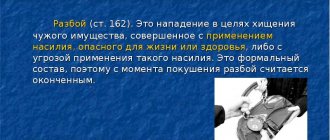Last year my neighbor was attacked by two guys. At first, the case was classified as an administrative offense, since the damage was minimal, both to health and material, but then it turned out that the neighbor had a concussion and a complex arm injury. As a result, the case was reclassified as a criminal offense, and when the young people were caught, they were charged.
Many people think that crime and misdemeanor are the same act, but in fact they are not. There is a significant difference between the concepts, ranging from the signs of a crime to the type of responsibility. Let us consider questions related to what is the main difference between an offense and a crime and on what basis do authorized persons distribute such acts.
What is an administrative offense
An administrative offense is an unlawful action against a specific person, property or law. It does not pose a danger to society, but it can cause negative consequences or undermine the established order in a certain area.
Such actions include violating public order or trespassing on personal property. Failure to comply with regulations regarding human health, ecology, and transport is also considered an administrative offense. The legislation provides for punishment under the current code.
Every illegal act is confirmed by an action or inaction that goes against the established rules. Actions may be committed intentionally or through negligence. As a result, the person is held accountable.
Administrative violations do not make a citizen socially dangerous. They allow him to remain in society. Despite the illegality of the actions, the consequences are quite mild.
These include the following:
- imposition of a fine depending on the severity of the article of law that was violated;
- arrest for up to 15 days;
- community service lasting up to 150 hours;
- deprivation of the right to engage in a specific type of activity.
The decision to initiate a case is made by an official appointed by the state. The decision is issued by the prosecutor. The investigation of the offense takes a maximum of 1 month. During this period, it is necessary to inspect the scene and collect evidence. Then a protocol on illegal actions is drawn up or the case is closed.
Concept of criminal offense
This term is used by lawyers to describe an illegal act directed against society. At the same time, the conditions of liability for it are regulated by the Criminal Code of the Russian Federation. Most often, such acts require the arrest of the offender.
Typically, criminal offenses involve the commission of actions that pose a threat to human life or health. They can also pose a danger to the property of an individual or the state. In addition, the crime may be directed against a specific organization or nature.
Expert opinion
Karnaukh Ekaterina Vladimirovna
Graduated from the National University of Shipbuilding, majoring in Enterprise Economics
The guilt or innocence of a person suspected of a crime is determined by the court. According to the Criminal Code of the Russian Federation, the convicted person cannot be under 16 years of age. If it turns out that the act does not constitute a crime, during the trial it can be reclassified as an administrative offense.
In essence, a crime represents a certain line beyond which the generally known norms of morality and law end. Therefore, people who crossed it are held accountable to the fullest extent of the law.
Crimes: meaning and signs of such acts
To understand the difference between administrative offenses and crimes, it is also necessary to understand what a crime is. The most significant difference is that the crime poses a danger to society and is regulated by articles of the Criminal Code of the Russian Federation. For crimes committed, the perpetrator is subject to isolation from other people, that is, imprisonment.
It should be noted once again that criminals always encroach on the life and health of people, on other people’s property or on the integrity of the foundations of the state. Compared to administrative offenses, crimes are more serious in nature and according to this principle are divided into types.
If there is no criminal element in the crime, then the person is released from criminal liability, and in the future has the full right to rehabilitation. In other cases, the case may be reclassified as administrative with subsequent penalties. Another important point is that people are brought to criminal responsibility only from the age of 16.
How are they similar?
Some articles of the Criminal and Administrative Codes are similar. However, it is important to accurately determine the extent of influence on the person who committed the crime.
Each system has a different protective function. It is implemented in various areas in society. All punishment measures used are educational in nature.
The state believes that a specific measure not only has a beneficial effect on the criminal himself, but also shows other members of society what awaits them if the law is broken.
What is the difference?
The law interprets administrative offenses and criminal offenses differently. Therefore they differ in many aspects.
Signs
The following signs are considered important differences between the violations under consideration:
- Encroachment on human life and health. A criminal offense implies a direct impact on the opponent’s personality - this can be bodily injuries of varying degrees of severity or other actions that pose a threat to human life. Administrative offenses involve the creation of special conditions under which the vital activity and normal functioning of the human body are limited.
- Impact on someone else's property. In criminal practice, the main articles in this part include “robbery”, “robbery”, “theft”. They characterize a certain action that is associated with the seizure or destruction of someone else's property by persons who are aware of the end result. In administrative offenses, a person damages property due to carelessness or negligence.
- An attack on generally accepted norms of behavior in society. In criminal practice, such crimes are considered acts that undermine the moral and legal foundations of the state. They are considered socially dangerous. Such articles include “extremism” or “inciting national hatred”. The Administrative Code also includes a similar article, in case of violation of which it is impossible to establish a direct antisocial effect on the laws. An example is “unauthorized use of state symbols.”
Compound
Both administrative and criminal offenses are characterized by the same composition, which includes the following elements:
- an object;
- objective side;
- subject;
- subjective side.
Responsibility
Criminal responsibility is for violating the laws provided for in the Criminal Code. Such crimes are considered socially dangerous and infringe on property, personality, public order, rights and freedoms of people.
Administrative liability is provided for violations that are provided for in the Administrative Code. Such acts, in particular, include violation of traffic rules and fire safety.
Investigation
If, after identifying an administrative offense, there is a need to conduct an examination or other procedural actions, an administrative investigation is carried out. This is often required in case of violations in the field of taxes and duties, antimonopoly legislation, and customs affairs. The duration of such an investigation should not exceed 1 month.
Criminal proceedings include a number of stages, one of which is the pre-trial investigation. At this stage, a medical examination, seizure of the crime weapon, selection of explanations, and obtaining expert opinions may be carried out.
Punishment
Administrative offenses involve relatively mild penalties. This could be correctional work, penalties, or a warning. Criminal liability threatens to imprisonment for several years.
Bringing to administrative liability prevents criminal prosecution
I would like to talk about a case from practice when the fact of bringing a client (the head of an organization) to administrative responsibility (insignificant for the defendant) became a serious obstacle to assigning him a criminal punishment for a crime classified as serious.
K. was accused of committing four serious crimes related to the theft of funds from the state budget in 2017–2018 - he was charged with two attempts at unjustified receipt of tax deductions and two episodes of illegal receipt of subsidies for business development. All crimes were classified by the investigation as fraud.
The indictment was approved by the prosecutor of the Vologda region, and in January 2022 the case was submitted to the Vologda City Court, where it was considered until the fall of the same year (about 15 hearings were held). The defendant and I, as at the stage of the preliminary investigation, insisted on his innocence of committing the incriminated acts, gave arguments in support, and provided evidence. The most important thing for us was that K. was charged with a complete crime under Part 4 of Art. 159 of the Criminal Code of the Russian Federation – theft of a subsidy from the budget in the amount of 9.6 million rubles. According to the defense, it was this composition that could have influenced K.’s sentencing in the form of actual imprisonment.
The defense drew the court's attention to the fact that the criminal case under this article was initiated under the following conditions:
- no damage, since the subsidy, in accordance with contractual relations, at the request of the regional economic development department, was returned to the budget, and the proceedings in the arbitration court ended with the department abandoning the claim;
- unrescinded decision to refuse to initiate a criminal case on the same fact - contrary to the provisions of paragraph 5 of Part 1 of Art. 27 Code of Criminal Procedure of the Russian Federation. The latter became possible due to law enforcement agencies conducting two parallel checks on the same fact;
- the fact that the defendant was brought to administrative responsibility for the same circumstances (indication of false information when receiving a subsidy for business development).
I note that the last two arguments, based on tactical considerations, were not presented by the defense at the stage of the preliminary investigation, and the investigative authorities themselves were unable to assess the significance of these circumstances.
During the debate, the prosecutor asked to find K. guilty of committing four crimes and to impose a punishment for the totality of acts in the form of 7 years in prison plus an additional punishment for the crime under Part 4 of Art. 159 of the Criminal Code of the Russian Federation in the form of a fine of 500 thousand rubles.
The court did not take into account the arguments of the defense, agreed with the qualifications proposed by the state prosecution, and found the defendant guilty of all charges, including the elements provided for in Part 4 of Art. 159 of the Criminal Code of the Russian Federation.
Taking into account the positive characteristics and information about the personality of the convict, the court commuted the main punishment, sentencing K. to suspended imprisonment. At the same time, he applied additional punishment under Part 4 of Art. 159 of the Criminal Code of the Russian Federation in the form of a fine of 900 thousand rubles. The latter, in the opinion of the defense, did not meet the principle of justice, taking into account K.’s financial situation, and also did not take into account the impact of penalties in the amount awarded on the living conditions of the convict’s family.
Taking into account the practice of appealing against sentences, namely the insignificant proportion of their changes at this stage, in agreement with the client, it was decided to appeal the decision of the first instance directly to the Third Cassation Court of General Jurisdiction.
The Cassation Court agreed with the arguments of the complaint regarding the legality of bringing the convicted person to justice under Part 4 of Art. 159 of the Criminal Code of the Russian Federation. At the same time, in the ruling dated June 9, 2022, the court indicated that within the meaning of Part 2 of Art. 6 of the Criminal Code of the Russian Federation and Art. 50 of the Constitution of the Russian Federation, bringing to administrative or other public legal liability for an offense excludes repeated prosecution for the same act. The cassation emphasized that since the decision that has entered into force and has not been canceled to bring the convicted person to administrative responsibility for committing acts imputed to him by the preliminary investigation authorities is an obstacle to passing a sentence, in terms of conviction under Part 4 of Art. 159 of the Criminal Code of the Russian Federation, it is subject to cancellation (including the cancellation of the sanction in the form of a fine of 900 thousand rubles), and the criminal case is subject to return to the prosecutor of the Vologda region on the basis of Art. 237 Code of Criminal Procedure of the Russian Federation.
At the same time, the cassation court ordered, when reconsidering the case, to assess the legality of its initiation under Part 4 of Art. 159 of the Criminal Code of the Russian Federation, and the arguments of the convicted person about his innocence in committing this crime.
The Court of Cassation also resolved the issue of funds illegally converted into state income. At the stage of preliminary investigation in a criminal case, during searches, funds in the amount of over 355 thousand rubles were seized. The investigation ignored the defense's arguments that the money belonged to the suspect's ex-wife. According to investigators, this was money obtained by K. through criminal means. At the same time, the investigator, sending the court a petition to seize the funds, did not notify that another person was claiming them.
As a result, the court, at the pre-trial stage of the proceedings, considered the investigator’s petition without the participation of interested parties - K. and his ex-wife, who were not informed about the meeting, and the funds were seized and deposited. The Vologda City Court also did not take into account the arguments of ex-wife K. and the evidence presented confirming that the funds belonged to her, and turned them into state income.
The Court of Cassation supported the defense's arguments and came to the conclusion that there were no grounds for turning these funds into state income, and also ordered that the issue of their ownership be resolved in the course of further proceedings in the case.
In my opinion, during the re-trial of the case, K. should again be charged with the crime under Part 4 of Art. 159 of the Criminal Code of the Russian Federation will be difficult, since more than three years have passed since he was brought to administrative responsibility.
The key to success in this case was, in my opinion, the correctly chosen defense tactics. It is no secret that it is not always possible to achieve positive results at the initial stages of the proceedings, so the defense lawyer needs to clearly understand how he will build a defense if the desired result is not achieved at this stage, and leave room for “maneuver”, not rush to “reveal his cards".
At the same time, based on the results of the analysis of the cassation ruling, I would like to draw attention to the following problem.
On the one hand, according to Art. 401.15 of the Code of Criminal Procedure of the Russian Federation, the grounds for canceling or changing court decisions in cassation are significant violations of the law that influenced the outcome of the case. On the other hand, based on the definition, the cassation court analyzed the verdict from the point of view of not only legality, but also validity, making an independent conclusion about the validity of the accusation, the reliability and sufficiency of the evidence - without having the right granted by law to interfere with the arguments of the cassation appeal about the unfoundedness of the verdict. That
In this case, the cassation, from my point of view, made a formal conclusion about the validity of the decision of the first instance.
In this regard, the question arises: why does the cassation court conduct, albeit a formal, but still an analysis of the validity of judicial decisions made by lower courts? It seems that the answer is obvious - without such an analysis, the trial cannot be considered complete.
I believe that in terms of the powers of cassation courts according to Art. 401.15 of the Code of Criminal Procedure of the Russian Federation, one can state a shortcoming of the legislator - in cases of obvious unfoundedness of the sentence, it seems appropriate to give cassation courts the right to overturn such sentences (by analogy with the rights granted by law to the appellate court). Currently, cassation has the right to interfere with the verdict only in case of significant violations of the law.
In conclusion, I note that if the cassation courts have the power to review, including unfounded court decisions, the criminal case against K. could have been changed to a greater extent, since in the cassation appeal the defense argued both the illegality and the unfoundedness of the verdict as a whole.






